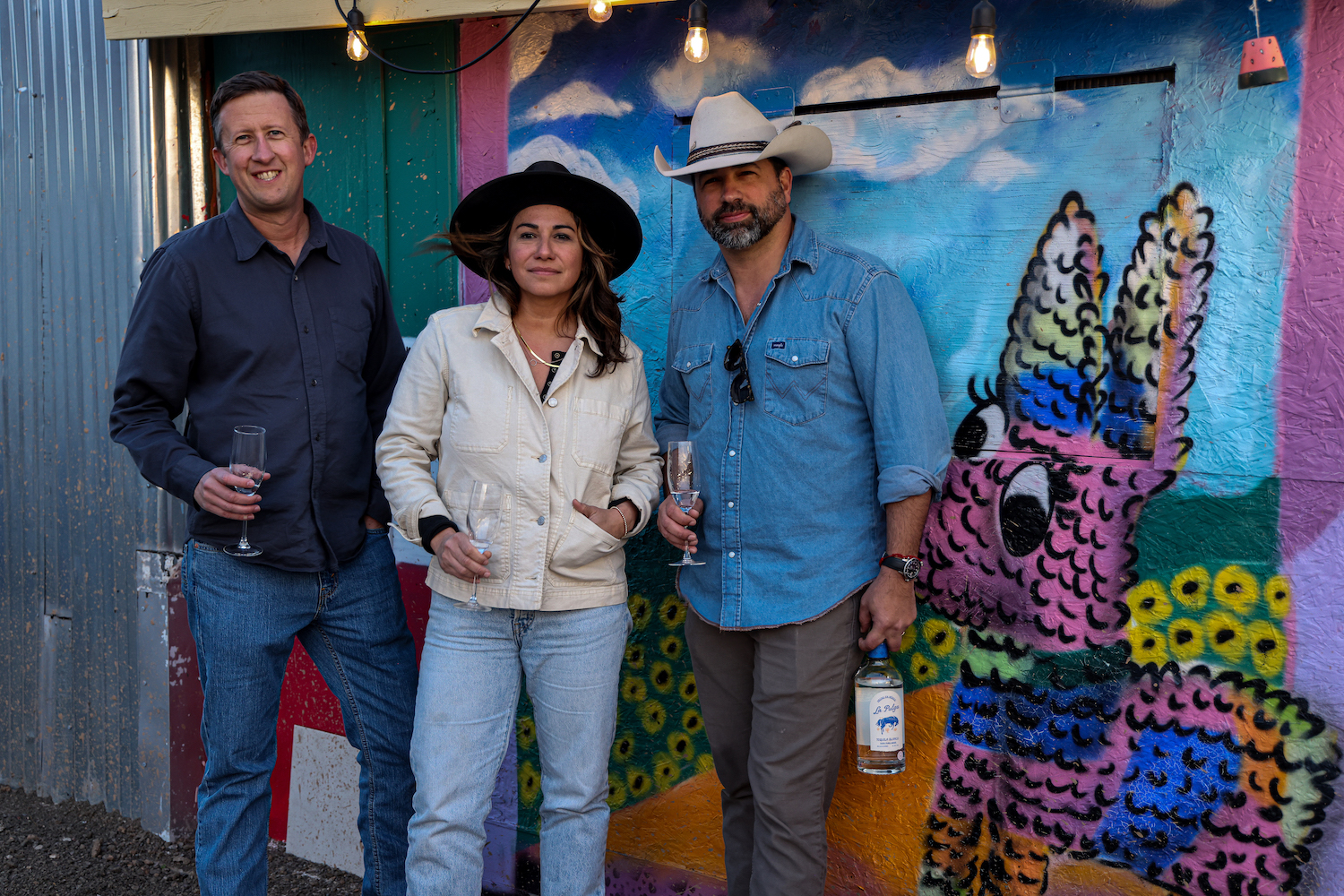Stroll through the outdoor market La Pulga on the north side of Fort Worth, and you’ll find vendors selling fruit and elote. Others hawk tools, clothing and electronics. Music is ever present. This cultural institution has anchored the community since the 1940s, but the pandemic nearly ended its run before a trio of like-minded locals banded together to save the market. Their weapon of choice: tequila.
La Pulga Spirits was founded by Fort Worth natives Sarah Castillo, the restaurateur behind Taco Heads, Tinies and Sidesaddle Saloon; Andrew De La Torre, a club owner who managed the flea market property for 10 years; and Stephen Slaughter, a local entrepreneur and real estate developer. The partnership was kismet.
Unbeknownst to one another, both Castillo and Slaughter were looking to start a tequila brand, and both had already started the process of researching how to make it happen. “If you’re going to start a tequila in Fort Worth, the person to call is Sarah Castillo,” Slaughter tells InsideHook. So he did, and learned of Castillo’s similar desire. Meanwhile, De La Torre was recruiting partners to purchase the 12-acre property where the flea market resides, in hopes they could save it from developers who wanted to knock it all down.
Once the ink was dry, the new business partners headed south. They met with distillers across Jalisco and tasted tequilas until they found the profile they liked best, deciding on a family recipe that rarely makes it out of Mexico. “They trusted us to bring it north of the border,” says Castillo.
Welcome to Tequila, Mexico: Heaven on Earth for Tequila Lovers
Here’s how to visit the 492-year-old town where waterfalls, opal mines and, of course, massive blue agave plants aboundTo shore up their spirits chops, the trio enlisted Ale Ochoa, who formerly served as the whiskey scientist and master blender at Firestone & Robertson Distilling Co., the makers of TX Whiskey. Ochoa previously made sotol in a one-off project, but was new to tequila, so she went to Mexico to learn the ropes, following the production from field to bottle.
La Pulga, which translates to “the flea” in Spanish, launched this spring with two expressions, a blanco and a reposado. Both start with 100% Weber blue agave grown in the Jalisco Highlands. The harvested piñas (agave hearts) undergo a unique hybrid process that combines two cooking methods. Some are cooked in traditional brick ovens for 36 hours, while others are cooked in modern autoclaves for 14 hours. The plants are then crushed to extract their juices, and combined and fermented together prior to distillation.
Ochoa compares the dual process to using a slower cooker and an instant pot, and says that it results in a depth of flavor that highlights the agave.
The unaged blanco is floral, with notes of cooked agave, grapefruit, anise and honey. The reposado is aged for seven months in barrels that first held bourbon and then held tequila, so by the time La Pulga’s juice gets inside, the wood’s impact is soft and subtle. Flavors include cooked agave, burnt sugar, licorice, honey and black pepper. An añejo release is slated for the fall.
La Pulga tequilas are additive-free and celebrity-free, both a point of pride for the founders.
Castillo acknowledges that brands like George Clooney-founded Casamigos and Kendall Jenner-backed 818 brought a lot of people into the tequila category, but such expressions often rely on additives, lean into sweet vanilla notes and tamp down the spirit’s authentic flavors. “We really want to change the perspective of tequila and do it the right way,” she says.
“We want to highlight the spirit and culture and the guys in Mexico doing the hard work in the fields and the distillery,” adds De La Torre.
The tequila is just one prong of the group’s plans. They’re developing a boutique hotel on the 12-acre grounds, and then they’ll build a small sotol distillery with a bar, tasting room and educational experience. Tequila must be made in Mexico, but sotol, which is made from the desert spoon plant that grows wild in northern Mexico and West Texas, can be produced stateside. Castillo, De La Torre and Ochoa, who are Mexican-American, view the tequila and the sotol as a way to honor the flea market and to share their heritage with the public.
“We want to bottle that culture and share it with people,” says De La Torre.
Join America's Fastest Growing Spirits Newsletter THE SPILL. Unlock all the reviews, recipes and revelry — and get 15% off award-winning La Tierra de Acre Mezcal.
